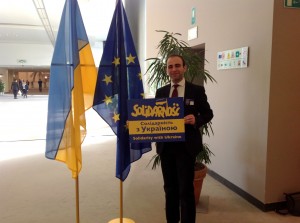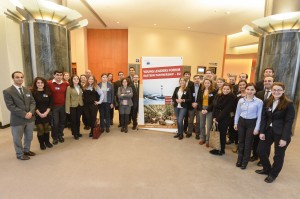Armenak Minasyants (AEGEE-Yerevan) has done many things in AEGEE and recently was re-elected as Policy Officer on the topic of European Integration. The AEGEEan interviewed Armenak to hear more about his time in AEGEE and his interest in the Eastern Partnership Project and more.
Why did you join AEGEE?
Good question! In the mid of 2010 I was looking for Yerevan-based youth NGO working and dealing with European projects. Sad to say, but at those times in my country (Armenia) we did not have many independent and politically non-affiliated youth NGOs, as even the student councils in our universities were very politically affiliated. So, just to be short, I accidentally found out that AEGEE-Yerevan’s first president, Shushan Khachatryan, was going to establish an AEGEE Contact in Yerevan, so I approached her and automatically became part of this family.
What have you been doing in AEGEE since joining the organisation?
Perhaps one of the most difficult and complicated questions to ask: for two years I was a Board member and President of AEGEE-Yerevan, twice elected as the Speaker of the International Politics Working Group (IPWG), for another year as the Main Team Member of the AEGEE Eastern Partnership Project, and last but not least, already for more than an year I have assumed the position of the Policy Officer on European Neighborhood Policy of AEGEE-Europe.
You have done many things on the local level of AEGEE, what good tips do you have when working on AEGEE in your local antenna?
My biggest advice to everyone involved on the local level of AEGEE would be to trust your colleagues and teams. I have been in many projects with huge amount of participants, and every time to get through any difficulty and to make a project happen you should dedicate yourself, work hard and first of all trust your team members.
How do you activate members in Yerevan?
If I were brutally honest, we have never had any problems with activating our members at AEGEE-Yerevan. Everyone joining AEGEE-Yerevan knows that it is some kind of a serious youth organization, which is considered to be the very leading one in the Armenia-EU relations youth sphere, thus every new member since the very beginning knows why he/she is joining the association, and the most important – what the Local Board expects from him/her. I am not mentioning the very good opportunity for all members to work in close partnership with the EU Centre in Armenia and the EU Delegation to Armenia, which are the partners of AEGEE-Yerevan and accordingly get much more professional skills. In general, this gives us strong and very motivated members, who are ready not only to attend local and European events, but also run their own in Yerevan.
You recently took part in the Eastern Partnership conference in Lithuania and also another one in Brussels at the European Parliament: how do you make time to attend different conferences?
I have a life motto “If I do something, I do it the best” and if I have been appointed to any position within AEGEE, day by day I should make my best to prove everyone that it has been a right appointment. Additionally, both projects were some kind of a landmark youth events on the Eastern Partnership, to which AEGEE-Europe must be present. As you mentioned, I took part in two conferences in a row: the first one was the EaP Youth Forum in Kaunas, which was convened within the frames of the Lithuanian Presidency in the Council of the European Union. It was a side event of the EU-EaP Vilnius Summit and the joint conclusions of our forum were sent to the heads of the EU and the EaP member states. The second one was the EU-EaP Young Leaders Forum, organized by the European Parliament. We had a big AEGEE delegation to this event and had a chance to meet up with the President of the European Parliament, the EU Commissioner for Enlargement and Neighborhood Policy and groups of MEPs.
What makes you interested in the EaP topic?
Probably my home country’s direct involvement in the EU Eastern Partnership Programme is one of the most important points. In AEGEE I have worked on the EaP thematic already for three years and to be honest I still see lots of room for our development and involvement.
What made you apply to become a Policy Officer on European Neighborhood Policy?
Personal and professional interest, good opportunity to work in close contact with the Comité Directeur and definitely the willingness to contribute to the thematic and policy work done within AEGEE.
What will you focus on as a Policy Officer on this topic within this term?
During the term of 2012-2013, I have already managed to develop a well-shaped and inclusive position paper of AEGEE-Europe on European Neighbourhood Policy, which was successfully ratified at the Autumn Agora Zaragoza 2013. I would like to state, that within this term I would try to follow up of the mentioned Position Paper of 2012/2013, through attending relevant meetings, conferences, events and/or sending it to the respective stakeholders. Another key point of my actions would be sustainable monitoring of news, reports, developments on EU Eastern Partnership Programme and Euro-Mediterranean Partnership. The interaction with the Network and development of the effective cooperation is one of the key priorities of this term. The experience of the past year shows, that without constant and active communication with the Network, it is quite difficult to imagine any success while drafting and presenting a comprehensive position paper not only to externals stakeholders, but also to the AEGEE Network.
How have you been following the situation in Ukraine?
I picked up the easiest way to follow up the situation in Ukraine: I visited Kyiv and EuroMaidan on December 6th-7th. Frankly, the scenes, enthusiasm and European spirit which I saw and felt at Euromaidan in Kyiv could not be simply described by words. Ukraine is an amazing country, with a huge territory, hard working people and natural resources, but on the other hand now it is in the middle of political speculations done by a third party. Once again I would like to state my strong commitment and belief that Ukraine’s future is connected only with the European values and the EU. Only civil dialogue could lead to overcoming this deep political crisis in Ukraine, and hopefully it seems now that the good conclusion to this story is very close.
How do you think AEGEEans can help each other when such situations occur?
We first of all should show our solidarity with our locals and members who are in such situations, as for them even one very short letter coming from Copenhagen, Brussels, and Yerevan or from any other place may be a very strong inspiration. At the same time, I strongly believe that it is already high time for AEGEE not only to react but act, when such situations occur. At least for Ukraine, I would just suggest to take a very short break and follow up on the situation development, but be sure, we would act if we would see the necessity.
Written by Patricia Anthony, AEGEE-København



